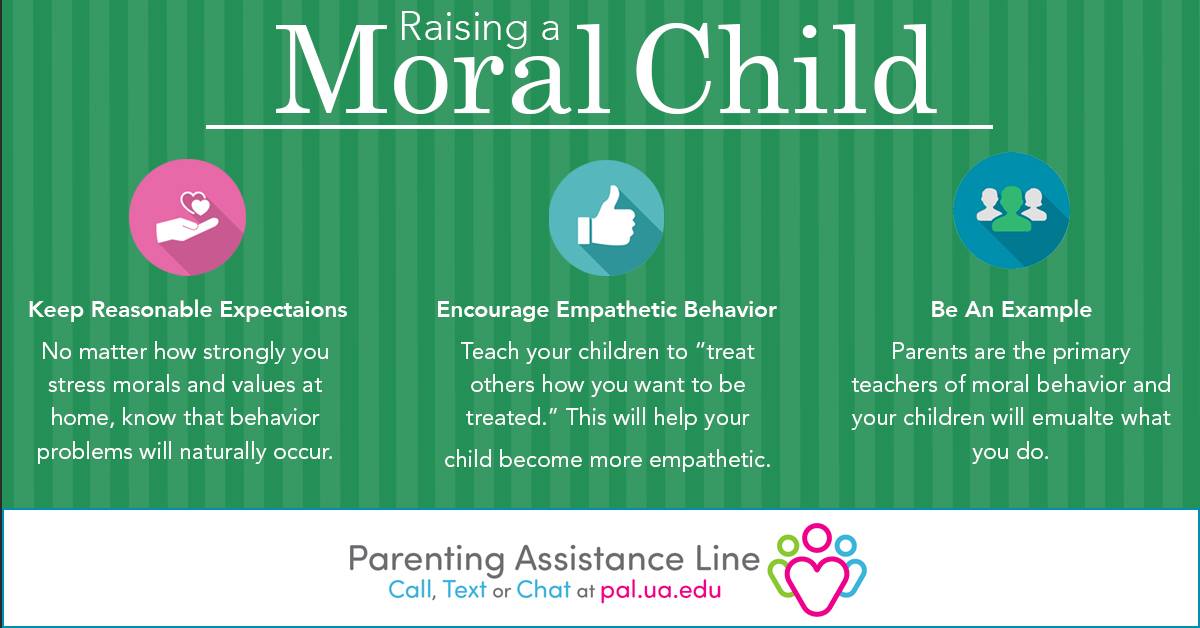Today’s children face difficult challenges and pressures long before their brains have developed the capacity to make wise choices. Therefore, it is essential that parents take seriously the need to start young and continue teaching their children moral values and principles as they mature. If we don’t, the media, their peers and other negative influences will fill that void.
The following tips will help you attain a positive outcome for your children’s future.
- Make a commitment – Successes of any kind first start with a commitment to the desired outcome. The same holds true for raising moral children. It won’t happen by accident. You must make it a priority and put forth a daily effort.
- Know your own values – It is difficult to teach children what you believe if you are not clear yourself. Think through the most important values you want instilled in your children…things like compassion, honesty, respect, responsibility, and integrity. Then take time to explain them clearly to your children. They will be hearing countless messages that are contrary to your beliefs, so it is important to reinforce your standards regularly.
- Consider developmental capabilities – Most children ages 5 or 6 have developed the basic components of conscience, a sense of guilt, the ability to distinguish between right and wrong, and the capability to be empathetic. But none of these elements of a child’s moral development will become fully functional for years. As children grow their ability to understand values, rules, and consequences matures also. Expecting a very young child to share willingly or say “I’m sorry” and mean it is unreasonable. Discipline with fear or punishment may get your children to behave, but they won’t be internally motivated to do the right thing. Using positive discipline, based on explanations and not demands, is especially important when it comes to instilling a healthy sense of right and wrong in children.
- Be an example – Parents are the primary teachers of moral behavior and your children will emulate what you do more than what you do more than what you say.
- Encourage empathetic behavior – The most valuable of moral lessons is the Golden Rule: “Treat others as you want to be treated”. Help your children to see how their behavior affects those around them. Point out how the offended one must be feeling and encourage your children to put themselves in another’s place. Children under the age of six or seven do not possess the ability to completely understand someone else’s viewpoint. Nevertheless, continue to reinforce empathetic behavior with praise when it does occur.
- Use teachable moments – Oftentimes the best teaching moments aren’t the ones that are planned. Watching television, reading together, and talking about daily events are all wonderful opportunities to impart family values.
- The two sides of discipline – Correcting unwanted behavior is only one part of discipline. It is also necessary to teach your children why something is wrong and brainstorm solutions for what can be done differently next time. Moral development involves acting morally, not just avoiding wrongdoing.
- Striking a balance – Indulgent and permissive parenting results in self-centered children who expect their every desire to be met. On the other hand, too many limits or harsh punishments can produce a low sense of worth and a lack of self-control. This usually results in an overly rebellious child or an unhealthy submissive one. It is necessary to find a healthy balance and keep in mind you are not merely punishing wrong behavior; you are shaping character.
- Keep expectations reasonable – No matter how strongly you stress morals and values at home, behavior problems still arise. Think of your efforts as a moral savings account; the work you put in today will pay off enormously in the future.
- The ultimate goal – The ultimate goal for your children is to internalize positive values so they will do the right thing even when you are not watching. It is not until adolescence that children are fully capable of this behavior. Clearly, this learning process demands patience and understanding. Don’t expect too much too soon!







